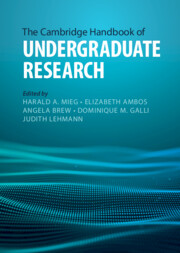Book contents
- The Cambridge Handbook of Undergraduate Research
- The Cambridge Handbook of Undergraduate Research
- Copyright page
- Contents
- Figures
- Tables
- Contributors
- Foreword
- Foreword
- 1 Introduction
- Part I Theory and Research on Undergraduate Research
- Part II Implementation, Approaches, Methods
- Part III Disciplines
- 17 Introduction
- Part III.1 STEM
- Part III.2 Health
- Part III.3 Social Sciences
- Part III.4 Humanities
- 32 Undergraduate Research in History
- 33 Undergraduate Research in English
- 34 Undergraduate Research in Philosophy
- 35 Undergraduate Research in Theology and Religious Studies
- Part III.5 Arts & Design
- Part III.6 Disciplines A–Z
- Part IV International Perspective
- Part V Avenues for Developing Undergraduate Research
- Index
- References
35 - Undergraduate Research in Theology and Religious Studies
from Part III.4 - Humanities
Published online by Cambridge University Press: 11 August 2022
- The Cambridge Handbook of Undergraduate Research
- The Cambridge Handbook of Undergraduate Research
- Copyright page
- Contents
- Figures
- Tables
- Contributors
- Foreword
- Foreword
- 1 Introduction
- Part I Theory and Research on Undergraduate Research
- Part II Implementation, Approaches, Methods
- Part III Disciplines
- 17 Introduction
- Part III.1 STEM
- Part III.2 Health
- Part III.3 Social Sciences
- Part III.4 Humanities
- 32 Undergraduate Research in History
- 33 Undergraduate Research in English
- 34 Undergraduate Research in Philosophy
- 35 Undergraduate Research in Theology and Religious Studies
- Part III.5 Arts & Design
- Part III.6 Disciplines A–Z
- Part IV International Perspective
- Part V Avenues for Developing Undergraduate Research
- Index
- References
Summary
The classical definition of theology reflects fides quaerens intellectum (faith seeking understanding). This definition underscores the premier role of faith, reason, and critical thinking in the exercise of theological studies. Religious studies for its part is a social science study of religion, which also applies critical thinking and reason in its research, but does not necessarily require faith. Therefore, both theology and religious studies have thrived by the application of the tools for critical thinking and reason. For undergraduate research in theology or religious studies, the methodological approach of students depends on the focus of the course. The different sub-disciplines of theology or religious studies adopt different approaches to research. Therefore, a course on the history of the Bible would require different research method and approach than a course about social justice or comparative religion. However, regardless of the course, it is important to always bear in mind that a typical piece of research on religious studies or theology will likely adopt diverse research approaches and methods.
Keywords
- Type
- Chapter
- Information
- The Cambridge Handbook of Undergraduate Research , pp. 337 - 344Publisher: Cambridge University PressPrint publication year: 2022

